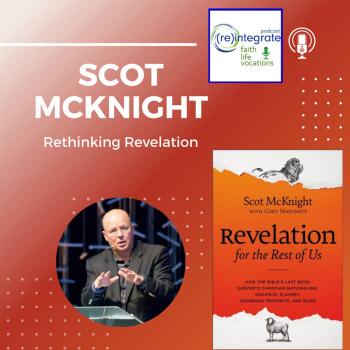“Heaven is important, but it’s not the end of the world!”
I laughed out loud when I heard N.T. Wright say this in one of his audio lectures.
It’s a perfect play on words. Not only is this a great figure of speech, but it is also the biblical teaching. Sure, heaven is great. But it is not the telos, the culmination of our existence as Christians.
Modern evangelicalism has adopted the paradigm that runs rampant in our culture, inherited from the Greek philosopher Plato. This pagan belief system teaches a dualistic separation between the “sacred” (that which is spiritual/ nonmaterial/ soul) and the “secular” (that which is physical/ material/ flesh). This false worldview led to the Gnostic heresy of the early Church. A gospel message influenced more by Plato than by the Scriptures looks like this:
- This world is an evil place. Your body is an evil thing.
- What you need is to escape this depraved place and this sinful flesh that houses your soul.
- Accept Jesus and when you die, your soul will have eternal life with God in heaven.
- …. ummm …
- End of gospel presentation.
But our ultimate destiny is not heaven, some disembodied spiritual existence for all eternity.

A biblical eschatology proclaims, as Paul Marshall’s book states, “Heaven is Not My Home.” Or as as Michael Wittmer’s book proclaims (with a nod to Belinda Carlyle), “Heaven Is a Place on Earth.”
Two of my all-time favorite books.
Heaven, according to Scripture, is that place where we go when we die, the place where God dwells. This is the place that Jesus speaks of when he tells the thief on the other cross, “today you will be with me in Paradise” in Luke 23:43. This is what theologians call “the intermediate state.” “Intermediate” because it is not our ultimate destiny.
My theology professor back in my days at Trinity Evangelical Divinity School explains:
Death is a temporary cessation of bodily life and a separation of the soul from the body. Once a believer has died, though his or her physical body remains on the earth and is buried, at the moment of death the soul (or spirit) of that believer goes immediately into the presence of God with rejoicing. However…God will not leave our dead bodies in the earth forever, for when Christ returns the souls of believers will be reunited with their bodies, their bodies will be raised from the dead, and they will live with Christ eternally. (Wayne Grudem, Systematic Theology, p. 816-17)
When Christ redeemed us he did not just redeem our spirits (or souls)—he redeemed us as whole persons, and this includes the redemption of our bodies. Therefore the application of Christ’s work of redemption to us will not be complete until our bodies are entirely set free from the effects of the fall and brought to that state of perfection for which God created them. In fact, the redemption of our bodies will only occur when Christ returns and raises our bodies from the dead. But at this present time, Paul says that we wait for “the redemption of our bodies,” and then adds, “for in this hope we were saved” (Rom. 8:23–24). The stage in the application of redemption when we receive resurrection bodies is called glorification. (Grudem, p. 828)
N.T. Wright, one of the world’s most renowned biblical scholars, has written a book that I highly recommend. He has an incredible gift of blending deep scholarship with readable prose that will keep every reader turning the pages.
 His book, Surprised by Hope, helps us to do exactly what the subtitle says: “Rethinking Heaven, the Resurrection, and the Mission of the Church.” He reminds us that the Bible actually does not just teach “life after death,” but rather “life after life after death!”
His book, Surprised by Hope, helps us to do exactly what the subtitle says: “Rethinking Heaven, the Resurrection, and the Mission of the Church.” He reminds us that the Bible actually does not just teach “life after death,” but rather “life after life after death!”
The April 2008 issue of Christianity Today offered an excerpt from the book that I implore you to read. Here’s a snippet:
“The traditional picture of people going to either heaven or hell as a one-stage, postmortem journey represents a serious distortion and diminution of the Christian hope. Bodily resurrection is not just one odd bit of that hope. It is the element that gives shape and meaning to the rest of the story of God’s ultimate purposes. If we squeeze it to the margins, as many have done by implication, or indeed, if we leave it out altogether, as some have done quite explicitly, we don’t just lose an extra feature, like buying a car that happens not to have electrically operated mirrors. We lose the central engine, which drives it and gives every other component its reason for working.”
“[I]n the ancient world, [resurrection] wasn’t a way of talking about life after death. It was a way of talking about a new bodily life after whatever state of existence one might enter immediately upon death. It was, in other words, life after life after death.”
What does it matter? Why is it so important to get our theology of resurrection correct?
“The mission of the church is nothing more or less than the outworking, in the power of the Spirit, of Jesus’ bodily resurrection. It is the anticipation of the time when God will fill the earth with his glory, transform the old heavens and earth into the new, and raise his children from the dead to populate and rule over the redeemed world he has made.
If that is so, mission must urgently recover from its long-term schizophrenia. The split between saving souls and doing good in the world is not a product of the Bible or the gospel, but of the cultural captivity of both.”
Amen.
Do yourself an Easter favor, and read Wright’s article at the Christianity Today website here:












